OnlyFans – Love of the Future?
Interview dated February 16, 2025
How long have you been active on OnlyFans?
Mila: I’ve been doing it since September ’21.
Okay, and is this truly your main occupation?
Mila: Since 2023—it was either May or March. From that point, I made it my full-time job; before that, I was still working in retail.

Why did you decide to switch?
Mila: Honestly, our goal was to travel and earn money from something we were already living. Right from the beginning of our relationship, we were swingers—just a week before we officially became a couple, we visited a swingers‘ club together—and my partner always enjoyed filming and photographing everything anyway. So, we already had a few videos. Then we thought: what is there in our life we can incorporate into our work to earn well while traveling? It was clear from the start; the only question was how to build it up.
Was it an easy entry? Basically, you just need the internet and be over 18. Did you seek out tips?
Mila: No, we explored it ourselves. Initially, we tried completely anonymously, posting only lingerie pictures and videos, nothing sexual. It was a careful exploration: what do I feel comfortable with? What do I enjoy? What is my path, where I can be 100% behind it when I post it and someone sees it? This is how it evolved into the content we produce today.

If you’re on X or Instagram nowadays, spicy content has become completely normal. Would you say it’s socially accepted or merely tolerated in your surroundings?
Mila: Accepted. In my surroundings, there is actually a lot of acceptance and tolerance.
Claudio: The thing is, if you know her personally, you realize who she truly is. She’s exactly the same person online. The real issue, given the current diversity, is that it’s only quantity-driven. Many people do this, but they all produce similar content and seem very artificial to me. They clearly portray themselves online as someone they’re not, and people notice that. I think that’s precisely why she is successful: we’re simply documenting our life, and she publishes it. It’s a bit more sexually daring and extravagant than others, but we didn’t adopt this lifestyle to create content. Instead, we began creating content because we genuinely live this way.
So, how is this in your offline life?
Mila: Some of my family members are pretty conservative but fully support me and are proud of me for going my own way—because they see that I’m entirely behind it and happy.

Do you get inquiries from other women or creators who want to start and need advice?
Mila: Once, I did a survey on TikTok, around the middle of our second year, I believe.
Claudio: Yes, we did that from time to time.
Mila: Quite a few people responded there, but otherwise, not really. Recently, I got another request from a woman who asked if I would support her if she started. But I don’t do it unless we create content together. That’s important to me because I want to get to know the person and avoid recommending anything shady to my followers.
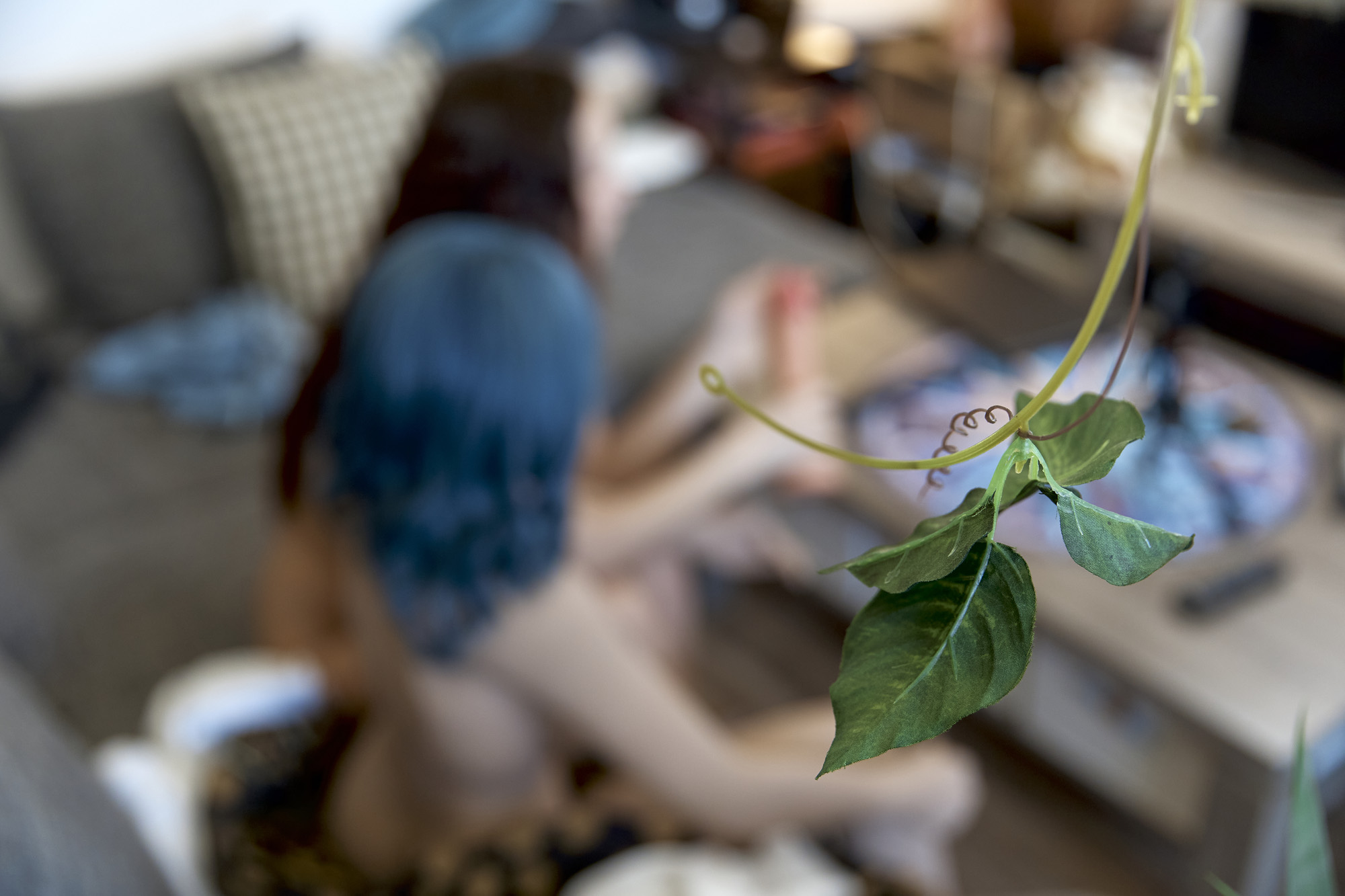
A few numbers: Users in 2019: 13.4 million – Users in 2024: projected 390 million; Creators in 2019: 0.3 million – Creators in 2024: projected 4.9 million. What do you think of these figures?
Mila: Standard porn is just worn out for many people. Many want it more personal again, especially after COVID, as so much personal interaction was missing.
Claudio: Especially personal aspects.
Mila: I believe people are now reclaiming this personal touch. I can easily imagine it continuing to rise.
Claudio: When you visit regular porn sites, porn actresses seem distant. But with Mila, you see her in TikToks, she answers comments, you can message her on Insta, and she replies—as long as it’s more meaningful than „Hi, you hot babe.“ It’s just a completely different level of accessibility. And that authenticity shows clearly. People seek this personal connection.
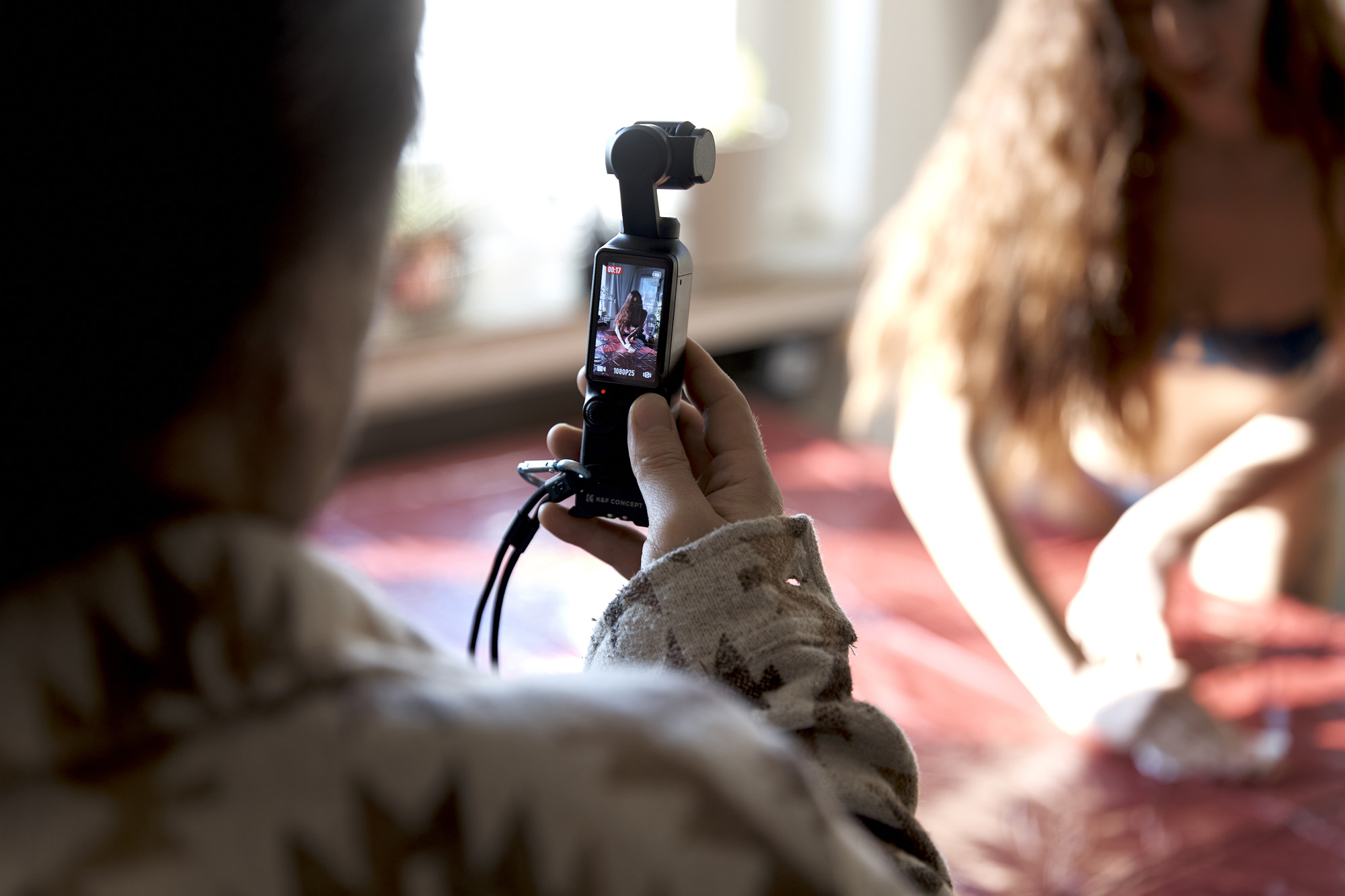
Do you think your subscribers see you partly as an „E-girlfriend“? 60% are under 35…
Claudio: Only a very small portion.
Mila: Yes, I think so too. Those who don’t actually interact with me might create fantasies based purely on my content. But every subscriber I have interacted with personally knows better.
Claudio: (…) Also, there are creators calling their subscribers “Baby” or “Honey” without knowing them. You can’t tell me that’s genuine. It’s fake. Because of this, some creators give followers false hope: „Wow, I think she really likes me!“ Mila doesn’t do this. She never says anything she doesn’t sincerely mean.
Mila: (…) The 60% number doesn’t surprise me at all. From my Instagram pictures, I see a lot of younger people. Recently, a girl contacted me because she was concerned her boyfriend recorded my stories and visited OnlyFans. It shows a younger audience is involved because older people wouldn’t typically have these issues. I can easily imagine this figure being accurate.

There’s a societal trend towards more single households and greater loneliness. Do you think OnlyFans fuels this trend?
Mila: It really depends on how the content is presented.
Claudio: Personally, I believe it does—but not through her. It’s more of a societal and family issue rather than something caused by the porn industry itself. Actually, I don’t even think porn has anything to do with it.

This family topic sounds intriguing. Could you elaborate further?
Mila: Today, both women and men have difficulties living relationships in a way they genuinely want. Everyone should feel free to choose their own path. But if you want to live a traditional family model nowadays, it’s very tough financially—one person alone can hardly support a family anymore. Many people who aspire to this lifestyle feel uncomfortable and socially unaccepted. Society should become more supportive again.
Claudio: I definitely don’t believe that OnlyFans will ever reach the status of the traditional porn industry. If you ask someone on the street about Gina Wild, everybody knows her as a porn star. But even the most prominent erotic OnlyFans creator, unless she’s already a traditional porn actress, wouldn’t achieve such widespread recognition. If anything, I believe the traditional porn industry might recruit popular creators from OnlyFans and elevate them to mainstream visibility.
Okay, interesting. Do you see it similarly?
Mila: Yes, definitely, because it’s an entirely different sector. That’s a valid point and the main reason it won’t become mainstream. There might be some mixing because traditional porn stars also join OnlyFans, but those who genuinely start on OnlyFans usually stick to their platforms.
Claudio: Consequently, they won’t significantly influence mainstream society, only specific subcultures—just as we potentially influenced young people in the swinger community.
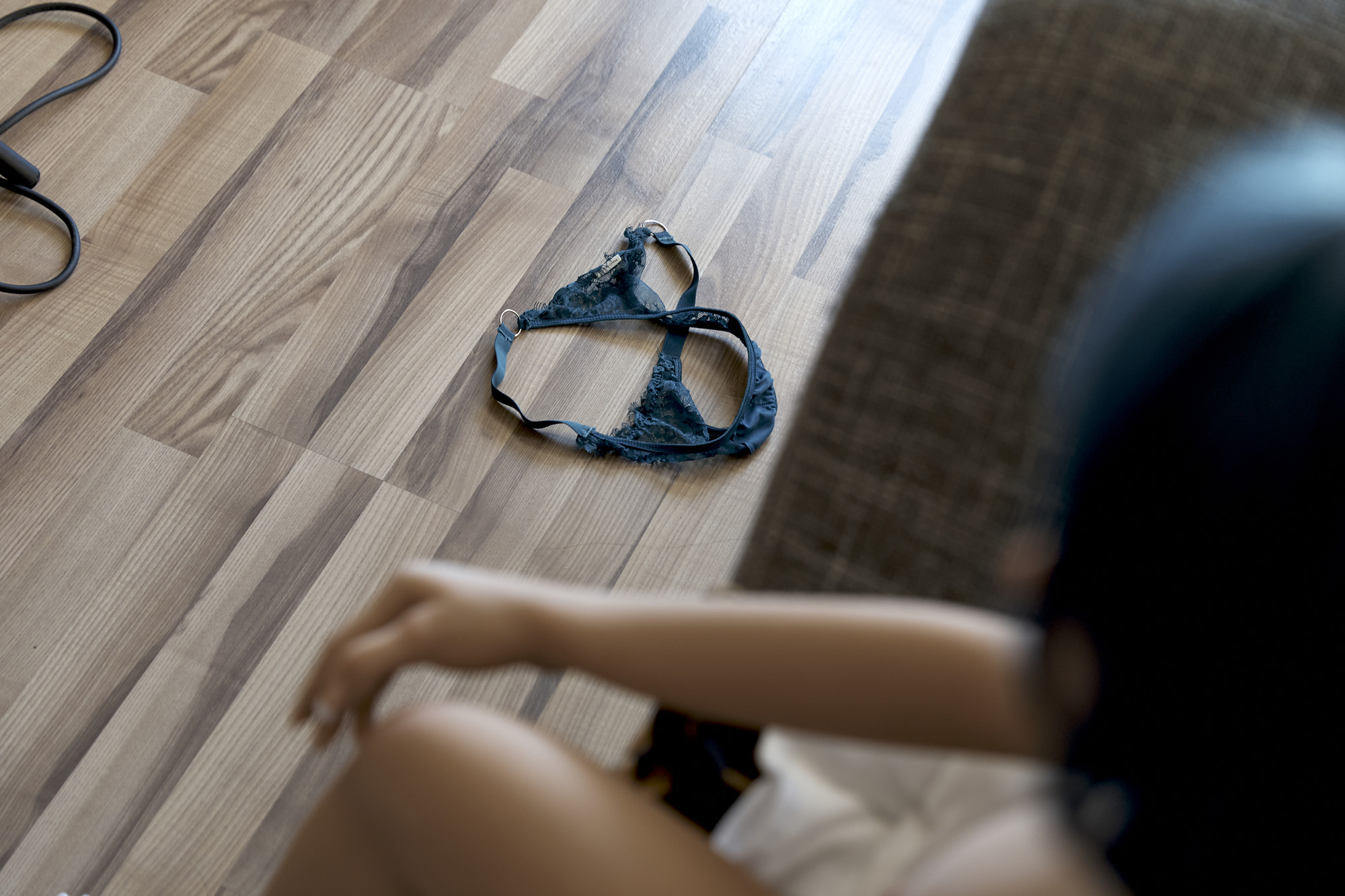
There’s a quote I recently heard: „Porn distorted men’s perception of women, and OnlyFans distorted women’s perception of men.“ Do you relate to this?
Mila: From my perspective, I don’t exploit men. My goal is a win-win situation: men get substantial content at a fair price. We mutually support each other—he eases his loneliness, and I earn my income. That’s how I view my work. Of course, pay-per-view content generates excellent revenue, and we offer this option for those unable to afford subscriptions. But purchasing single videos individually can be as expensive as a whole subscription. However, I suspect most women on OnlyFans are simply there to take advantage of men financially.

Is your private content being commercialized further? When significant money is involved, many want a share—what about OF agencies?
Mila: Yes, there are many more agencies now, and they’re treating all content creators alike. So far, I haven’t encountered an agency doing things differently. Their messages often seem identical. Given the rising number of agencies offering convenience, more women are tempted to join them, making content more monotonous. However, many women leave quickly if they’re not bound by lengthy contracts. Still, agencies continue to exist and adapt their strategies to remain competitive. It’s up to each creator to decide their own path.
But do you trust that your colleagues will remain self-determined—that this platform will stay in your hands?
Mila: I think most creators will keep control. Those who specifically choose OnlyFans or similar platforms do so because they want independence and full control. I find it difficult to imagine them willingly giving up their autonomy to an agency.
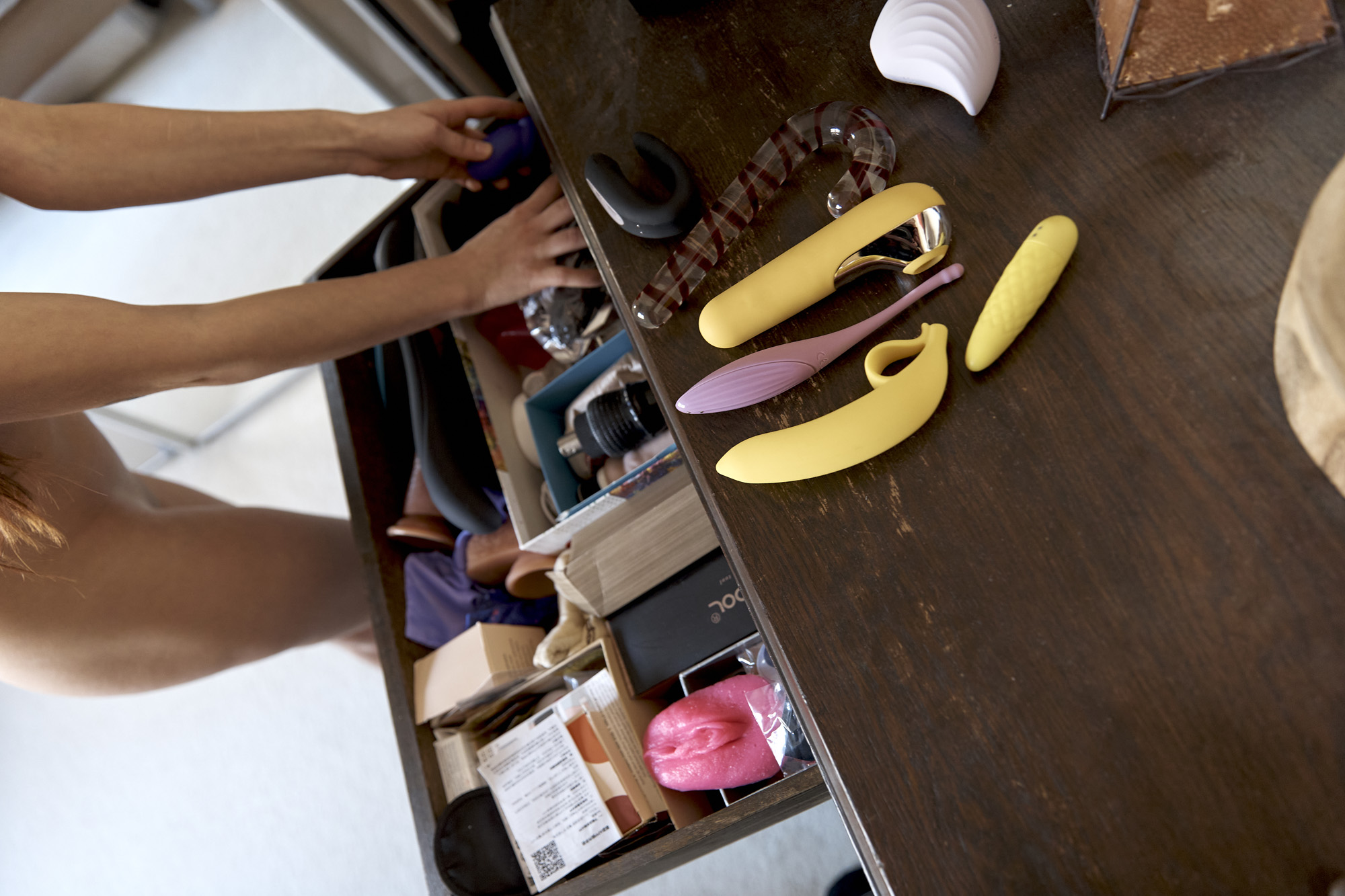
Do you think AI avatars will become serious competitors?
Mila: I’m somewhat concerned that AI might steal our digital identities. I’ve already experienced this through a friend who received a video from a subscriber showing her having a fake conversation. It’s unsettling. Fake profiles pretending to be me already contact my subscribers, engaging intimately with them and requesting vouchers or money. Unfortunately, many people fall for it because they’re excited that „I“ wrote to them. I’ve posted several videos warning my subscribers: „Hey, be cautious! I don’t initiate contact.“
Claudio: People always try new things, but nothing matches genuine interactions—whether it’s natural cosmetics versus synthetic products, or vinyl records versus MP3s. Ultimately, people revert to appreciating authenticity. A vinyl record that you care for offers a richer, more valuable experience than a digital file.
Mila: Exactly. That’s precisely why OnlyFans is thriving. My main fear is that eventually, people might think an AI-generated video featuring me is real. Imagine an AI creating 15 viral videos daily—outperforming me dramatically. That worries me—not that people prefer AI over authenticity, but that they might be deceived.
But in the end, do you believe you’ll navigate this challenge successfully?
Mila: I think so. As long as I’m aware and maintain direct contact with my audience, I’ll remain their trusted source. Subscribers already reach out via Instagram whenever they encounter fake profiles or feel unsure. If this continues, everything will be okay, though it is genuinely scary.
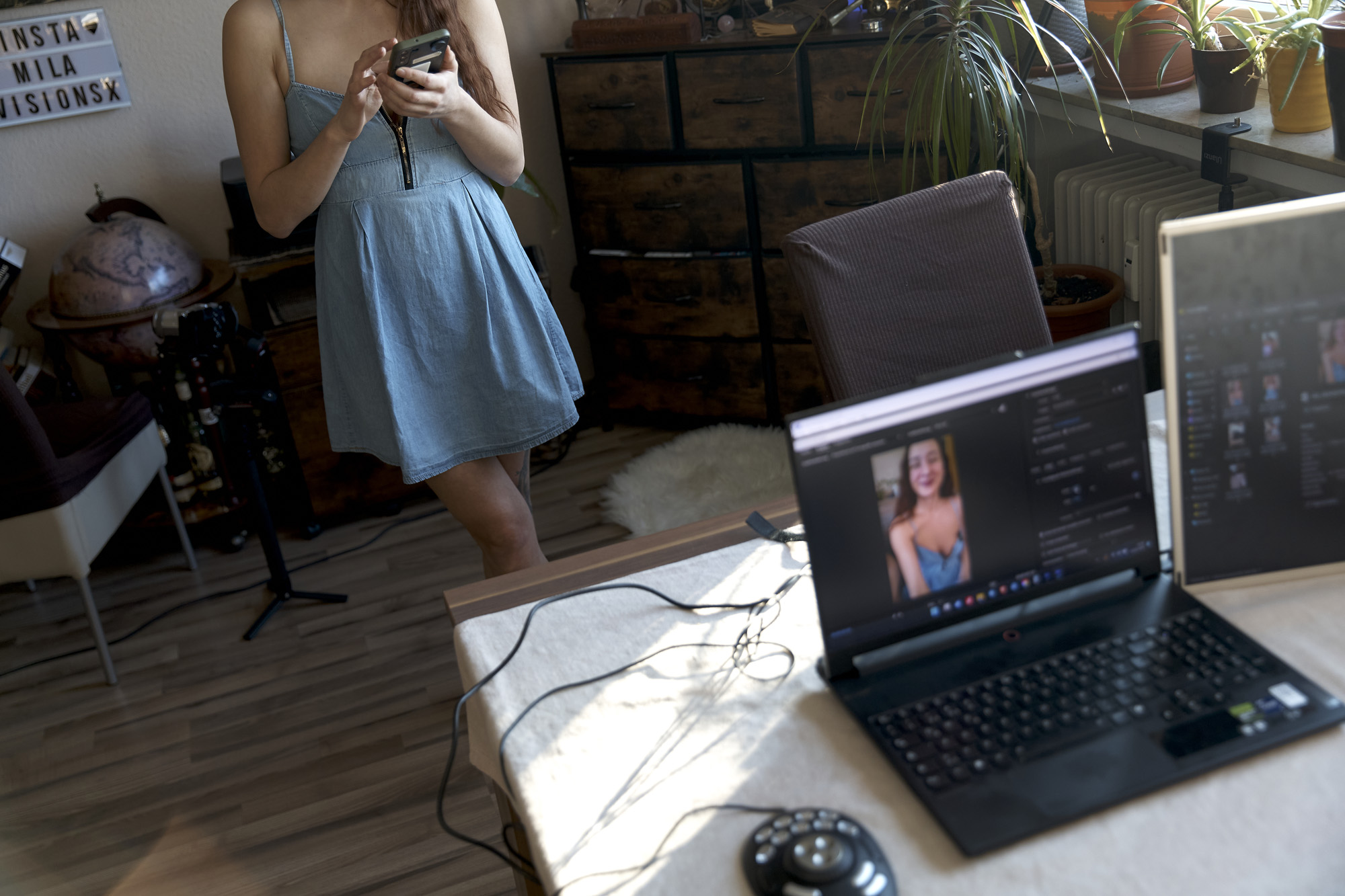
Some might say: „You’re 18 and want easy money? Just do OnlyFans.“ It seems to be the easiest way to earn money…
Mila: It’s definitely not!
Could you elaborate?
Mila: It’s certainly not the easiest way to earn money. You need at least a year to even become recognized online. It took us around a year to grow to a point where we thought: „Oh yes, this could actually work.“ I’d strongly advise everyone to approach it exactly as we did—to always stay safe and comfortable. It’s not pleasant if you’re confronted about something you feel ashamed of later on. I’d recommend this route to everyone: stay true to yourself, do only what you enjoy, and avoid getting involved in questionable things. This approach always takes a while, and you have to remain consistent. My husband likes to say: „The internet never forgets, but it forgets quickly.“ If you’re inconsistent, that’s it. If you don’t post for a week, you’ll earn maybe just 30 euros that week. That’s always the issue. It’s not easy, and content has to be posted even if you feel terrible or look terrible. You always have your phone with you, ideally recording everything. If you really aim for big money, it’s even more intense—ideally, you’d have someone following you around nonstop with a camera. So no, it’s definitely not easy money. It’s good money, rewarding money—but certainly not easy.

But can you blame young women who, perhaps naively, just want to earn money quickly without traditional jobs because society offers them so little?
Mila: No, I can’t blame anyone, but I do think it’s somewhat naive. I was younger too, and without my partner guiding me, I’d have made significantly more mistakes. If I’d tackled this alone, driven by the idea of „quick money,“ I would’ve probably stumbled badly. Once your reputation is damaged online… As I mentioned, while the internet does eventually forget, things occasionally resurface. That’s why caution is necessary. I’d advise against rushing into it. Instead, I’d recommend reaching out to experienced content creators whose work you respect, asking them for insights. If there were better communication among creators, it could genuinely improve the industry. I’ve often experienced women never contacting me again after hearing how demanding it actually is.

Do you think these people are missing in society when it becomes increasingly lucrative and more creators emerge?
Mila: Do you mean on the job market specifically?
Claudio: No, they aren’t missing. Most just earn extra pocket money. To live from OnlyFans, especially in Germany, requires generating substantial revenue—something newcomers quickly realize. This forces most creators to continue regular employment. Given the broader social context, questioning creators‘ societal contributions seems irrelevant.
Mila: Plus, in theory, we pay significant taxes, so the money returns into society. It’s not lost; it’s reinvested.
Claudio: And she still has her hairdressing qualification.
Mila: Exactly, I’m a trained hairdresser, and I advise everyone to have a backup plan. Sort your life first, then consider other options—that’s my advice.
I genuinely expected you to encourage everyone to pursue OnlyFans, claiming it’s easy money.
Mila: You shouldn’t start unless you have thick skin and are fully aware that eventually, everyone around you will find out. Everyone! (…) That’s why authenticity is crucial. I’ve had days when negative comments on TikTok completely overwhelmed me. Now he deletes the harshest comments, preventing me from seeing them. Having someone protect your emotional well-being like that isn’t guaranteed. I have thick skin; I care about others‘ opinions but can usually dismiss them. However, constant unsolicited comments can still hurt deeply.
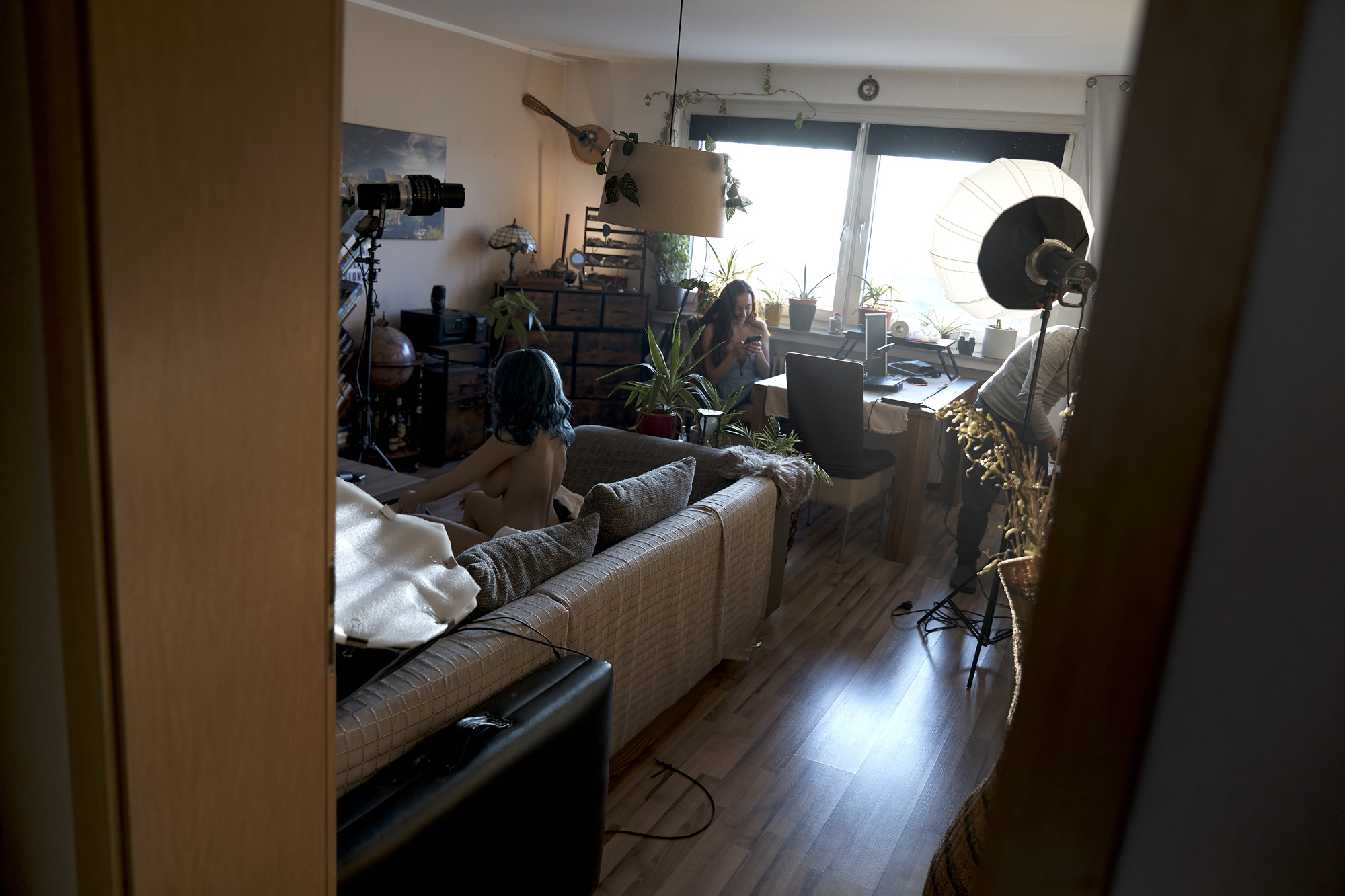
One last question regarding society: as numbers indicate, creators and users are rapidly growing. Is this society okay?
Mila: No, it’s not.
Claudio: But this issue isn’t really connected. Yes, society has plenty of problems.
Mila: Possibly. People need eroticism in their lives. If something like personal interaction is missing, as it often is in mainstream pornography, they’ll seek it elsewhere—like OnlyFans. It’s definitely a product of society, but the root problem lies elsewhere.
Claudio: The lonely person sitting at home doesn’t become lonelier because we film sexual content. When we purchased a realistic sex doll, we realized how easily someone isolated could project fantasies onto it. While I acknowledge loneliness as a genuine social issue, I don’t see us significantly contributing to it. Among friends, we avoid describing ourselves as porn creators, preferring phrases like „we document our sex life.“ Once you say „porn,“ you immediately become associated with the mainstream porn industry.
Recently, an OnlyFans creator publicly announced her intention to sleep with 1,000 men. Thirty years ago, this might not have caused headlines, but today, the internet seemed captivated.
Mila: That’s partly related to feminism. (…) She is self-determined, openly embracing her choice, and society now celebrates women for exercising this freedom. Women can and should do what they want—I fully support that. This societal shift comes from a changed mindset.
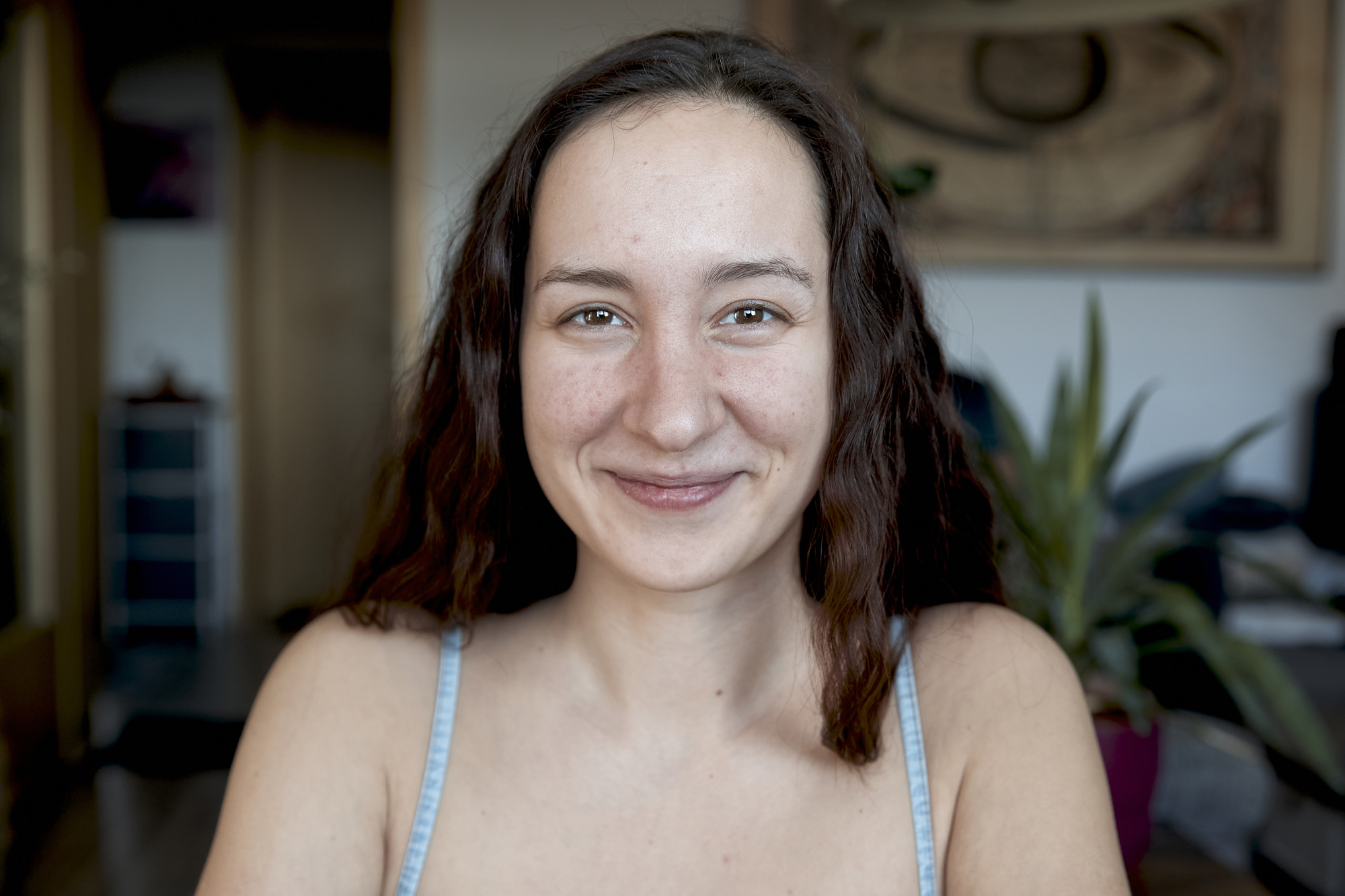
Interesting point on feminism. Are we heading in the right direction?
Mila: Pressure usually creates resistance. If feminism becomes overly aggressive, it generates resentment—especially against men, which I find completely wrong. People should be seen as individuals, regardless of gender. For me, the correct path is forward-looking, not focused on past wrongs. Living authentically and openly interacting with others promotes your beliefs far better than just criticizing others.
Finally, can feminism—or let’s call it equality—and OnlyFans coexist?
Mila: Equality, yes. But equality means recognizing that we all possess different strengths and qualities. It doesn’t mean we’re identical—men and women have different strengths. True equality recognizes this and values people accordingly. Issues like feminism and racism often miss the mark because they start from confrontation instead of love and understanding. If we prioritized these, we wouldn’t face these conflicts.
Does real-life love diminish as the number of creators rises, possibly discouraging people from seeking it offline?
Mila: Again, the problem doesn’t lie with creators but with people being hesitant to form genuine connections. Many have unrealistic standards, preventing real relationships from forming. If we taught love, acceptance, and understanding starting in kindergarten and schools, interactions would improve. We’d talk more openly, meet new people, and find better relationships naturally. Therefore, the problem isn’t creators exploiting a gap—they’re merely responding to an already existing one.